China Insight
Critical Essay: “The Hype Surrounding Zibo BBQ is a Sign of Social Wasteland”
The essay suggests that the recent popularity of Zibo BBQ is a symptom of a society that’s all about consumerism and empty social spectacle.
Published
3 years agoon
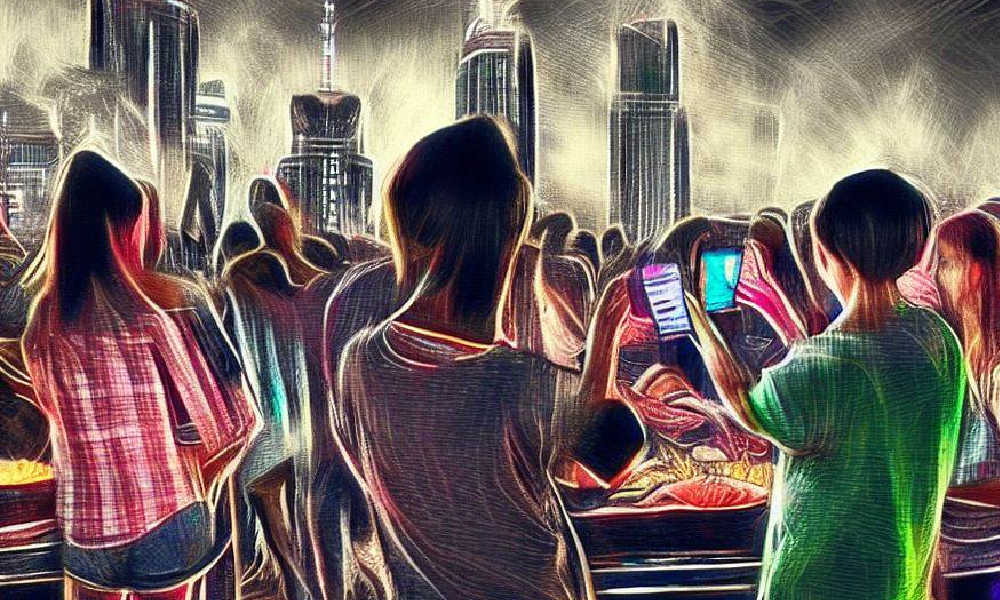
Fast, fun, BBQ travel is a major topic on Chinese social media these days. One WeChat essay recently attracted attention for arguing that the hype surrounding Zibo barbecue is a symptom of a “sick society” in which people are disconnected from meaningful topics. While serious social issues are muted and superficial marketing tricks are blasted all over the internet, China’s “hypocritical youth” actively participate in the societal emptiness they say they reject.
Everyone is talking about Zibo. The old industrial city in Shandong suddenly became the hottest city in China earlier this year when big groups of young people hopped on trains to seize the post-Covid travel opportunity and enjoy a BBQ-filled weekend.
As described in our previous article on Zibo, the town achieved hit status through a combination of factors: its appealing local barbecue culture, the city’s hospitality to students in difficult zero Covid times, the 2023 spring travel craze, smart city marketing, and the social media trends surrounding Zibo which further fueled the hype.
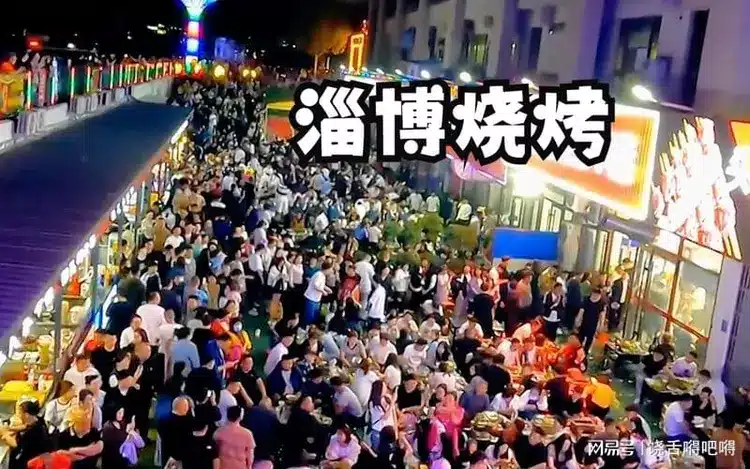
The Zibo BBQ craze. Image via 163.com.
Ever since April and throughout this Labor Day holiday, Zibo managed to crawl into Chinese social media’s top trending lists on a daily basis. And now Zibo has also become part of a bigger travel trend by Chinese younger generations that is all about fast, frugal fun (read here).
But despite all the videos showing BBQ parties, travel excitement, and smiling visitors, the Zibo hype is not all about roses, and there are also voices criticizing the craze.
One of these voices is that of the author of a recent article titled “The Hype Surrounding Zibo BBQ is a Sign of Social Wasteland” (“淄博烧烤走红是社会荒芜的表现”), which was posted by Chinese Professor of Journalism and Communication Liu Yadong (刘亚东).
Liu Yadong is a senior journalist and former editor-in-chief of Science and Technology Daily (科技日报). He is now a professor at Nankai University and the Dean of School of Journalism and Communication.
Although the article is attributed to Liu in most Weibo discussions, the article originally appeared on the WeChat account Jiuwenpinglun (旧闻评论), authored by ‘Picture-Taking Master Song’ (照相的宋师傅), pen name of prominent Chinese journalist Song Zhibiao (宋志标).
The article includes some hot takes on China’s recently hyped Zibo travel culture, which is strongly connected to social media governance and city marketing initiatives. The aurthor argues that the Zibo craze is a symbol of “societal illness” that uses temporary hypes, facilitated by social media, to cover up existing problems and, most of all, is a sign of a society that is devoid of true value.
It also criticizes those netizens/young people that jump in on the hype. Despite claiming to go against various top-down policies, they willingly and collectively are driving the hypes that are supposedly also part of dynamics that are strategically used by those in power to maintain influence.
Here, we provide a full translation of the short essay, translated by What’s on Weibo. Some parts are loosely translated or slightly edited for clarity, the Chinese original is included for your reference.
“The Hype Surrounding Zibo BBQ is a Sign of Social Wasteland” [TRANSLATION]
“Zibo barbecue has gone viral overnight, and with giant steps, we’re seeing a preposterous scene unfold: crowds of people are flocking to Zibo, long lines are forming in front of the BBQ stalls, the municipal government is making emergency preparations in various ways to facilitate “two-way travel” for young people coming to the city. This immersive scene is unfolding at the barbecue grills, while we are seeing Zibo’s ‘northeasternisation’ (东北化)* and the accelerated desolation of society. *[‘Dongbei-ization’ or ‘northeasterisation’ is a term used to refer to the phenomenon where people are leaving the northeastern provinces of China and moving to other provinces or regions which are then ‘northeasternized.’]
This desolation of society does not refer to a lack of people or empty streets. On the contrary, the contemporary social wasteland is crowded, grimy, and lively. The youth, in particular, are unconsciously marching in the same direction, and with fervor, they are chewing on Zibo BBQ ‘soul food’ as if they were devouring their own souls. In this existence, we are witnessing the demise of certain parts of themselves and our own.
Many people really want to explore the reasons why Zibo became such a hype, and they can list various factors, but they all stay at the instrumental level and do not go beyond it. This kind of result of up-and-down marketing of [China’s] cultural tourism industry is not so much because of collusion between local officials and traffic-generating mechanisms, as it is a random and hollow expression of society’s desolation. Society is sick, and the hyping of things like barbecue is just a symptom of that.”
淄博烧烤一夜走红,正在大踏步铺陈一副荒诞景象:成群结队的外地人蜂拥前往,烧烤摊前排满长队,市政府正在从各个方面应急建设,以奠基淄博与年轻人的“双向奔赴”。这是发生在烧烤架边上的沉浸式场景,淄博东北化,而社会加速荒芜化。
这里的社会荒芜并不是指人流量稀少,或街面荒凉,相反,现在的社会荒芜群集、油腻且热闹,尤其是年轻的躯壳无意识地追求整齐划一的动作,以饱满的热情,像吞噬自己灵魂一样咀嚼淄博烧烤的“灵魂三件套”。这样的存在,见证了自己和他人某些部分的死亡。
有人很想探究淄博烧烤走红的成因,罗列各种因素,但都停留在工具的层面,而没有往前更推进一步。这种文旅行业乍起乍落的营销成果,与其说是主政者与流量制造机制的合谋,莫若说是社会荒芜化随机的、空洞的表现。社会病了,烧烤等走红是它的症状。”
“It’s especially the young people that are unconsciously moving in the same direction and, full of enthusiasm, they are chewing on Zibo BBQ ‘soul food’ as if they were devouring their own souls.”
“Pulling stunts like turning barbecue into an online sensation and tourism bureau directors dressing up etc., help places to be covered by a huge filter, and it enables local authorities’ supervisory departments to shift their cultural and creative thinking to the short video era. One of the characteristics of the short video era is the shrewd operation that appears to conform to the lifestyle of the lower classes, grabbing their attention and using large-scale deception to cover up the rapid social barrenness of everyday life.
In this everyday life, a large number of more valuable topics are first decoupled from power, and then detached from the people closely related to them. In this process, these meaningful topics receive blows from two directions: firstly they are restrained and smeared by authorities, and then they are ridiculed and abandoned by the public. The erosion of our basis of values is similar to the process of desertification, and it is achieved through manipulation and conformation.
It seems that we can’t regard the people in this social wasteland purely as tools. They happily laugh in front of the barbecue stalls, they skillfully jumble up words and use special characters on social media to be influenced and influence others. For a moment, they forget about the ubiquitous risk of unemployment, and without a sense of history or awareness of problems, they fantasize about the next paradise.
The satirical thing is that while the young generation prides itself in ‘lying flat’ and in rejecting the policy lines [that encourage them] to have more kids, struggle, buy houses, etc, they vigorously participate in a movement to create a landscape of social desolation. The social wasteland provides them with a life kit where one thing after the next comes dashing up and then speeds away. This makes the wastage of the hypocritical youth especially evident, and because they are overly exploited, they are particularly ill.”
“烧烤网红、文旅局长便装等把戏,让一个地方罩上巨大的滤镜,帮助当局的主管部门从文创思维过渡到视频时代。短视频时代的特征之一,就是以名义上附和底层生活方式的精明操作,收割底层的注意力,以规模化的欺骗掩盖社会急速荒芜的日常。
在这种社会日常中,大量更有价值的议题先是与权力脱钩,再与和议题密切相关的人群脱钩。脱钩过程,价值议题遭到了两个方向的捶打:先是被权力遏制与污化,然后再受到民众的嘲笑与抛弃。价值基础的流失近似荒漠化进程,在操作与附和中达致。
似乎还不能将荒芜社会中人视作完全的工具人,他们在烧烤摊前发出快乐的笑声,他们娴熟地使用掺杂字母、异形字的话术在社交媒体上接承接灌输并灌输别人。一时间,他们忘了四面楚歌的失业风险,没有历史感与问题意识,却在畅想下一个乐园。
讽刺的是,年轻世代一边以躺平自诩,排斥多生、奋斗、买房等政策口径,另一边却精力旺盛地参与社会荒芜化的造景运动。社会荒芜提供了一个个飞奔而来又疾驰而去的生活套件,这让虚伪的年轻人损耗尤其明显,也因为被过度地利用,他们病得特别厉害。
“The people in this social wasteland aren’t just tools as they happily laugh in front of the barbecue stalls. For a moment, they forget about the risk of unemployment, and without a sense of history or awareness of problems, they fantasize about the next paradise.”
“The short video and click-through economy originated on the internet, and with the aid of the social wasteland, they have given birth to plastic flower-like gardens. The official attitude is very straightforward. On the one hand, they tame the flow of serious topics, directing and filtering their moral assessment; and on the other hand, they utilize it [the short video & click-through economy] to their advantage, harnessing the power of traffic to soften underlying anxieties.
Recently, cultural tourism chiefs in all parts of the country, according to the symbols of their local culture, competed with each other in [online] costume shows put together due to safe traffic flows.* These costume shows, realized for the sake of clicks, ended up straight in the social corner of topics such as the Zibo BBQ stalls – because there are no social topics to compete with, – and similarly resonated with spirit-lacking audiences. *[for more information on this trend, see our article about the cultural tourism chief video hype here.]
The “Zibo BBQ hype” and the trend of “cultural tourism chiefs costume” may appear as noteworthy accomplishments for cultural tourism bureaus, but the growth of such “light industry” is insufficient in addressing real issues, let alone the ongoing financial crisis affecting different regions. It is ineffectual in resolving the predicaments of economic development. While it is hailed in a desolate society, it may only serve as a temporary distraction, numbing the senses and blinding people from reality.
In the process of society becoming more desolate, the concept of “yān huǒ qì” (烟火气)* is almost destined to be emphasized, and it carries a feeling of nationalism and forlorn. Its visual effect is quite impressive, providing the illusion for both young and old in a desolate society, while dulling the strict street order enforced by the city police, giving people a feeling of intoxication. With the twinkling of the neon lights and the smoke filling up the air, the world can be anything.
*[Yān huǒ qì is a 2022 buzzword, initially means the smoke and fire produced from cooking food, but after ‘zero Covid,’ the phrase has come to be used to capture how restaurants and the hospitality sector across China seeing vitality again.]
Not long ago, ‘yān huǒ qì’ was a rhetoric to decorate the facade of the controlled economy, but now its existence has become like a common understanding between the government and the people. This rhetorical resonance, recited from above and echoed from below, has unexpectedly masked the perspective the term ‘yān huǒ qì’ represents, [namely that of] those in power overseeing it.”
“短视频及流量经济是局域网的原创,它们借助社会荒芜衍生出塑料花一样的花园。官方的取态非常干脆,它一方面驯化严肃议题的流量呈现,引导阻击它的道德评价;另一方面,它又滥用“为我所用”的原则攫取流量利益,以柔化深层次的焦虑。
前段时间,各地文旅局长按照当地的标志性文化,竞相登上由到安全流量组装而成的变装秀场。这些冲着流量变现而去的变装秀,因为没有与之竞的争社会议题,它们长驱直入到类似“淄博烧烤摊”的社会角落,与精神贫乏的受众同频共振。
“淄博烧烤走红”,“文旅局长变装”也许可作为文旅局的业绩,但这种“轻工业”的繁荣无法求解真问题,丝毫不减席卷各地的财政危机,更无助于解决经济发展的困境。当然,它们在荒芜社会空间搞出几声官民合唱,兴许可以暂时麻醉神经,遮断望眼。
在社会荒芜化的进程中,“烟火气”这个词得以强调几乎是命中注定,带着某种民族性与悲凉感。它的视觉效果相当可观,为荒芜社会提供了老少皆宜的幻觉,同时钝化了城管严控的街头秩序,令人们获得醉酒般的感受,假如霓虹闪烁,缭绕烟雾,亦可人间万象。
在不久之前,“烟火气”还是装点管控经济门面的修辞,现如今成为官民共识一样的存在。这种上有念叨、下有回声的修辞共鸣,出人意料地掩盖了“烟火气”这个词所象征的权力俯瞰视角,社会的荒芜化不仅蚕食价值议题,也以不知畏惧的憨态吞噬阶级差异。
“Have you considered that the desolation of society does not necessarily make it safer? In fact, it may just be another extreme form of a risky society. It is only ignored because the script of click-through traffic plays around the clock.”
“Similar to the intensity of a desert storm, the attention span of a desolate society is also brief, and the pace of the attention economy is fast. In a desolate society, the density of life for its members is low, and they can bear with or ignore their quality of life, but they cannot endure a short-lived infatuation. As the Zibo barbecue hype gained momentum, the countdown to the conclusion of the Ding Zhen craze* had already commenced. *[read about the hype surrounding Ding Zhen here.]
Some people believe that eliminating social diversity will also eliminate certain unpopular hidden dangers. However, have you considered that the desolation of society does not necessarily make it safer? In fact, it may just be another extreme form of a risky society that is ignored because the script of click-through traffic keeps playing around the clock. While you can control the click-through traffic, the logic of a decaying society remains uncontrollable.
Ultimately, the Zibo barbecue hype is very boring. It offers little solace to the government’s concerns about development or the public’s pressures for survival, unless we define a drunken and reckless lifestyle as positive. While we cannot fully blame the click-through economy for the desolation of society, it does contribute to numbing society’s awareness of how it operates, and the warning signs of a hollow society are all around us”.
“就像沙漠上的风暴特别强,荒芜社会的注意力也相当有限,注意力经济快速来也会快速去,毕竟荒芜意味着社会成员的生活密度低,他们可以容忍或漠视生活质量,但无法容忍略微时长的钟情。就在淄博烧烤走红的同时,始乱终弃的丁真式命结局就开始倒计时。
有人以为,消除了社会的多元化,就可以消除某些不受待见的隐患。何曾想,社会的荒芜化并不与安全社会划等号,它是风险社会的极端形式之一,只因日夜不停上演的流量剧本被忽视了。流量或许可以驯服,但社会荒芜化却沿着它的逻辑如脱缰之马。
说到底,淄博烧烤走红是非常无聊的事,它既不能真正安慰官方的发展焦虑,也无法减轻大众的生存压力,除非醉生梦死也被定义为积极的生活方式。当然,流量无法为社会的荒芜化负上全部责任,但它在合谋中钝化社会敏感度也是事实,荒芜将警讯紧紧包裹。”
Online Responses
The short essay is a critique of China’s youth, the online media sphere, and the click culture that goes from one hype to the next. But it is also a serious critique of Chinese authorities and the dynamics in place to mute serious social issues while blasting superficial trends.
The author suggests that everything is becoming less diverse (places like Zibo are ‘northeasternized’) and that society is actually so empty that people are constantly trying to fill the holes of their attention with the next meaningless buzz. Besides Zibo BBQ (link), he also mentions the Cultural Tourism chief cosplay trend (link), and the sudden rise to fame of Ding Zhen (link).
With Zibo and other domestic travel destinations being such a hot topic on Chinese social media recently, Liu’s critical essay – published on WeChat account Jiuwen Pinglun 旧闻评论 on April 17 – has inevitably become a topic of discussion.
By now, the essay has been deleted from Weixin, but online screenshots are still circulating online and have triggered new discussions this Labor Day holiday week (this link and this ifeng link are also still active). Various Weibo threads on the essay received hundreds of likes and comments over the past two days.
Some bloggers on Weibo value Liu’s perspective. As one blogger (@校长梁山) writes: “This is a thoughtful and high-quality article that you rarely come across (..) I have no intention of criticizing the government, but in terms of social management, the views in this article are worth thinking about.”
“Actually, he is right,” another commenter writes: “What he’s expressing is that the current economic downfall cannot be solved by the next barbecue hype, but this is something the media is burying” (the idiom used is yǎn ěr dào líng 掩耳盗铃, meaning covering one’s ears while stealing a bell, burying one’s head in the sand).” Those agreeing with the author suggest that Zibo’s success might be a win for its local cultural tourism department, but actually says nothing about a recovery of other industries and economy at large.
But there are also those who think Liu’s perspective is outdated and that, while talking about a lack of meaning, his own words are actually meaningless: “I have no idea what he is talking about.”

Zibo crowds, image via 163.com.
Some say he is making a big fuss over nothing, suggesting that it is only normal for people to want to seek for entertainment and simple pleasures like eating BBQ skwers, and that it does not represent a bigger problem at all. He is “moaning over an imaginary illness,” one Weibo user wrote (“wú bìng shēn yín” 无病呻吟).
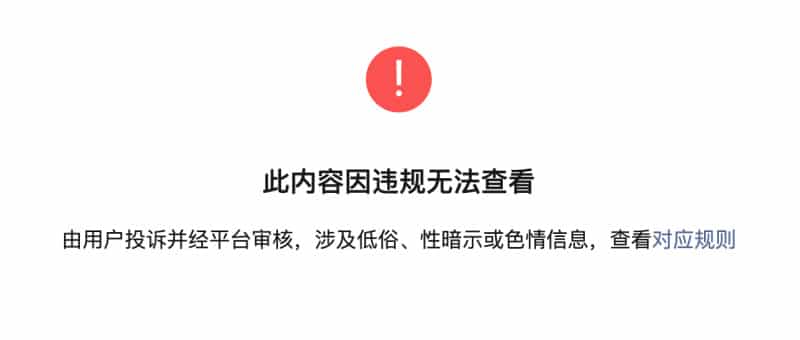
Content deleted on WeChat.
Although not everyone agrees with Liu’s takes, many do agree that it gives food for thought. However, the deletion of the essay itself and the removal of some related online comment threads also prevents further discussions on the topic, which ironically exemplifies one of the issues that the author aimed to address in his essay.
By Manya Koetse
Edited May 19, 2023: An earlier version of this article suggested Liu Yadong (刘亚东) is the original author of the critical essay. Although the article is attributed to Liu on Chinese social media, Liu reposted it and had his own bio under the article, but the original (censored) article is authored by Song Zhibao (宋志标).
Get the story behind the hashtag. Subscribe to What’s on Weibo here to receive our newsletter and get access to our latest articles:
Spotted a mistake or want to add something? Please let us know in comments below or email us. First-time commenters, please be patient – we will have to manually approve your comment before it appears.
©2023 Whatsonweibo. All rights reserved. Do not reproduce our content without permission – you can contact us at info@whatsonweibo.com.
Manya is the founder and editor-in-chief of What's on Weibo, offering independent analysis of social trends, online media, and digital culture in China for over a decade. Subscribe to gain access to content, including the Weibo Watch newsletter, which provides deeper insights into the China trends that matter. More about Manya at manyakoetse.com or follow on X.

China Brands, Marketing & Consumers
Signals: Hasan Piker’s China Trip & the Unexpected Journey of a Chinese School Uniform to Angola
Hasan Piker’s controversial China tour, a Chinese school uniform resurfaces in Africa, a new winter hotspot, why Chinese elites ‘run’ to Tokyo, and more.
Published
4 days agoon
November 21, 2025
🌊 Signals — Week 47 (2025)
Part of Eye on Digital China, Signals highlights slower trends and online currents behind the daily scroll. This edition was sent to paid subscribers — subscribe to receive the next issue in your inbox.
Welcome to another edition of Eye on Digital China. Different from the China Trend Watch (check the latest one here if you missed it), this edition, part of the new Signals series, is about the slower side of China’s social media: the recurring themes and underlying shifts that signal broader trends beyond the quick daily headlines. Together with the deeper dives, the three combined aim to give you clear updates and a fuller overview of what’s happening in China’s online conversations & digital spaces.
For the coming two weeks, I’ll be traveling from Beijing to Chongqing and beyond (more on that soon) so please bear with me if my posting frequency dips a little. I’ll be sure to pick it up again soon and will do my best to keep you updated along the way. In the meantime, if you know of a must-try hotpot in Chongqing, please do let me know.
In this newsletter: Hasan Piker’s controversial China tour, a Chinese school uniform in Angola, a new winter hotspot, discussions on what happens to your Wechat after you die, why Chinese elites rùn to Tokyo, and more. Let’s dive in.
- 💰 The richest woman in China, according to the latest list by Hurun Research Institute, is the “queen of pharmaceuticals” Zhong Huijuan (钟慧娟) who has accumulated 141 billion yuan (over 19 billion USD). Women account for over 22% of Chinese billionaires (those with more than 5 billion RMB), underscoring China’s globally leading position in producing wealthy female entrepreneurs.
- 🧩 What happens to your WeChat after you die? A user who registered for NetEase Music with a newly reassigned phone number unexpectedly gained access to the late singer Coco Lee’s (李玟) account, as the number had originally belonged to her. The incident has reignited debate over how digital accounts should be handled after death, prompting platforms like NetEase and Tencent to reconsider policies on long-inactive accounts and take stronger measures to protect them.
- 📱 Although millions of viewers swoon over micro-dramas with fantasy storylines where rich, powerful men win over the “girl next door” through money and status, Chinese regulators are now stepping in to curb exaggerated plots featuring the so-called “dominant CEO” (霸道总裁) archetype, signaling stricter oversight for the booming short drama market.
- ☕ A popular Beijing coffee chain calling itself “People’s Cafe” (人民咖啡馆), with its style and logo evoking nationalist visual nostalgia, has changed its name after facing criticism for building its brand – including pricey coffee and merchandise – on Mao era and state-media political connotations. The cafe is now ‘Yachao People’s Cafe’ (要潮人民咖啡馆).
- 👀 Parents were recently shocked to see erotic ads appear on the Chinese nursery rhymes and children’s learning app BabyBus (宝宝巴士), which is meant for kids ages 0–8. BabyBus has since apologized, but the incident has sparked discussions about how to keep children safe from such content.
- 🧧The 2026 holiday schedule has continued to be a big topic of conversation as it includes a 9-day long Spring Festival break (from February 15 to February 23), making it the longest Lunar New Year holiday on record. The move not only gives people more time for family reunions, but also gives a huge boost to the domestic travel industry.
Hasan Piker’s Chinese Tour & The US–China Content Honeymoon
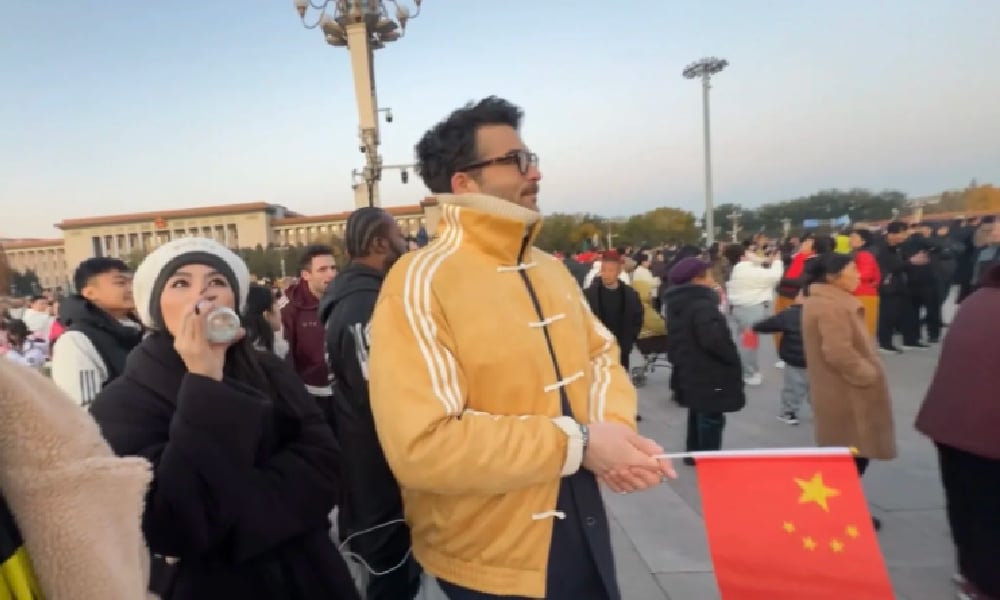
Livestreamer Hasan Piker during his visit to Tiananmen Square flag-rising ceremony.
It’s not time for the end-of-year overviews just yet – but I’ll already say that 2025 was the US–China ‘honeymoon’ year for content creation. It’s when China became “cool,” appealing, and eye-grabbing for young Western social media users, particularly Americans. The recent China trip of the prominent American online streamer Hasan Piker fits into that context.
This left-wing political commentator also known as ‘HasanAbi’ (3 million followers on Twitch, recently profiled by the New York Times) arrived in China for a two-week trip on November 11.

Piker screenshot from the interview with CGTN, published on CGTN.
His visit has been controversial on English-language social media, especially because Piker, known for his criticism of America (which he calls imperialist), has been overly praising China: calling himself “full Chinese,” waving the Chinese flag, joining state media outlet CGTN for an interview on China and the US, and gloating over a first-edition copy of Quotations from Chairman Mao (the Little Red Book). He portrays China as heavily misrepresented in the West and as a country the United States should learn from.

Hasan Piker did an interview with CGTN, posing with Li Jingjing 李菁菁.
During his livestreaming tour, Hasan, who is nicknamed “lemonbro” (柠檬哥) by Chinese netizens, also joined Chinese platforms Bilibili and Xiaohongshu.
But despite all the talk about Piker in the American online media sphere, online conversations, clicks, and views within China are underwhelming. As of now, he has around 24,000 followers on Bilibili, and he’s barely a topic of conversation on mainstream feeds.
Piker’s visit stands in stark contrast to that of American YouTuber IShowSpeed (Darren Watkins), who toured China in March. With lengthy livestreams from Beijing to Chongqing, his popularity exploded in China, where he came to be seen by many as a representative of cultural diplomacy.

IShowspeed in China, March 2025.
IShowSpeed’s success followed another peak moment in online US–China cultural exchange. In January 2025, waves of foreign TikTok users and popular creators migrated to the Chinese lifestyle app Xiaohongshu amid the looming TikTok ban.
Initially, the mass migration of American users to Xiaohongshu was a symbolic protest against Trump and US policies. In a playful act of political defiance, they downloaded Xiaohongshu to show they weren’t scared of government warnings about Chinese data collection. (For clarity: while TikTok is a made-in-China app, it is not accessible inside mainland China, where Douyin is the domestic version run by the same parent company).
The influx of foreigners — who were quickly nicknamed “TikTok refugees” — soon turned into a moment of cultural celebration. As American creators introduced themselves, Chinese users welcomed them warmly, eager to practice English and teach newcomers how to navigate the app. Discussions about language, culture, and societal differences flourished. Before long, “TikTok refugees” and “Xiaohongshu natives” were collaborating on homework assignments, swapping recipes, and bonding through humor. It was a rare moment of social media doing what we hope it can do: connect people, build bridges, and replace prejudice with curiosity.
Some of that same enthusiasm was also visible during IShowSpeed’s China tour. Despite the tour inevitably getting entangled with political and commercial interests, much of it was simply about an American boy swept up in the high energy of China’s vibrant cities and everything they offer.
Different from IShowSpeed, who is known for his meme-worthy online presence, Piker is primarily known for his radical political views. His China enthusiasm feels driven less by cultural curiosity and more by his critique of America.
Because of his stances — such as describing the US as a police state — it’s easy for Western critics to accuse him of hypocrisy in praising China, especially after a brief run-in with security police while livestreaming at Tiananmen Square.
Seen in broader context, Piker’s China trip reflects a shift in how China is used in American online discourse.
Before, it was Chinese ‘public intellectuals’ (公知) who praised the US as a ‘lighthouse country’ (灯塔国), a beacon of democracy, to indirectly critique China and promote a Western modernization model. Later, Chinese online influencers showcased their lives abroad to emphasize how much ‘brighter the moon’ was outside China.
In the post-Covid years, the current reversed: Western content creators, from TikTok influencers to political commentators, increasingly use China to make arguments that are fundamentally about America.
Between these cycles, authentic cultural curiosity gets pushed to the sidelines. The TikTok-refugee moment in early January may have been the closest we’ve come in years: a brief window where Chinese and American users met each other with curiosity, camaraderie, and creativity.
Hasan’s tour, in contrast, reflects a newer phase, one where China is increasingly used as a stage for Western political identity rather than a complex and diverse country to understand on its own terms. I think the honeymoon phase is over.
“Liu Sihan, Your School Uniform Ended Up in Angola”: China’s Second-Hand Clothing in Africa

A Chinese school uniform went viral after a Chinese social media user spotted it in Angola.
“Liu Sihan, your schooluniform is hot in Africa” (刘思涵你的校服在非洲火了) is a sentence that unexpectedly trended after a Chinese blogger named Xiao Le (小乐) shared a video of a schoolkid in Angola wearing a Chinese second-hand uniform from Qingdao Xushuilu Primary School, that had the nametag Liu Sihan on it.
The topic sparked discussions about what actually happens to clothing after it’s donated, and many people were surprised to learn how widely Chinese discarded clothing circulates in parts of Africa.
Liu Sihan’s mother, whose daughter is now a 9th grader in Qingdao, had previously donated the uniform to a community clothing donation box (社区旧衣回收箱) after Liu outgrew it. She intended it to help someone in need, never imagining it to travel all the way to Africa.
In light of this story, one netizen shared a video showing a local African market selling all kinds of Chinese school items, including backpacks, and people wearing clothing once belonging to workers for Chinese delivery platforms. “In Africa, you can see school uniforms from all parts of China, and even Meituan and Eleme outfits,” one blogger wrote.
When it comes to second-hand clothing trade, we know much more about Europe–Africa and US–Africa flows than about Chinese exports, and it seems there haven’t been many studies on this specific topic yet. Still, alongside China’s rapid economic transformations, the rise of fast fashion, and the fact that China is the world’s largest producer and consumer of textiles, the country now has an enormous abundance of second-hand clothing.
According to a 2023 study by Wu et al. (link), China still has a long way to go in sustainable clothing disposal. Around 40% of Chinese consumers either keep unwanted clothes at home or throw them away.
But there may be a shift underway. Donation options are expanding quickly, from government bins to brand programs, and from second-hand stores to online platforms that offer at-home pickup.

Chinese social media users posting images of school/work uniforms from China worn by Africans.
As awareness grows around the benefits of donating clothing (reducing waste, supporting sustainability, and the emotional satisfaction of giving), donation rates may rise significantly. The story of Liu Sihan’s uniform, which many found amusing, might even encourage more people to donate. And if that happens, scenes of African children (and adults) wearing Chinese-donated clothes may become much more common than they now are.
Laojunshan: New Hotspot in Cold Winter

Images from Xiaohongshu, 背包里的星子, 旅行定制师小漾
Go to Zibo for BBQ, go to Tianshui for malatang, go to Harbin for the Ice Festival, cycle to Kaifeng for soup dumplings, or head to Dunhuang to ride a camel — over recent years, a number of Chinese domestic destinations have turned into viral hotspots, boosted by online marketing initiatives and Xiaohongshu influencers.
This year, Laojunshan is among the places climbing the trending lists as a must-visit spot for its spectacular snow-covered landscapes that remind many of classical Chinese paintings. Laojunshan (老君山), a scenic mountain in Henan Province, is attracting more domestic tourists for winter excursions.
Xiaohongshu is filled with travel tips: how to get there from Luoyang station (by bus), and the best times of day to catch the snow in perfect light (7–9 AM or around 6–6:30 PM).
With Laojunshan, we see a familiar pattern: local tourism bureaus, state media, and influencers collectively driving new waves of visitors to the area, bringing crucial revenue to local industries during what would otherwise be slower winter months.
WeChat New Features & Hong Kong Police on Douyin
🟦 WeChat has been gradually rolling out a new feature that allows users to recall a batch of messages all at once, which saves you the frantic effort of deleting each message individually after realizing you sent them to the wrong group (or just regret a late-night rant). Many users are welcoming the update, along with another feature that lets you delete a contact without wiping the entire chat history. This is useful for anyone who wants to preserve evidence of what happened before cutting ties.
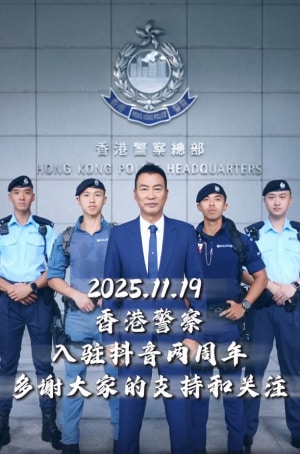
🟦The Hong Kong Police Force recently celebrated its two-year anniversary on Douyin (the Chinese version of TikTok), having accumulated nearly 5 million followers during that time. To mark the occasion, they invited actor Simon Yam to record a commemorative video for their channel (@香港警察). The presence of the Hong Kong Police on the Chinese app — and the approachable, meme-friendly way they’ve chosen to engage with younger mainland audiences — is yet another signal of Hong Kong institutions’ strategic alignment with mainland China’s digital infrastructure, a shift that has been gradually taking place. The anniversary video proved popular on Douyin, attracting thousands of likes and comments.
Why Chinese Elite Rùn to Japan (by ChinaTalk)
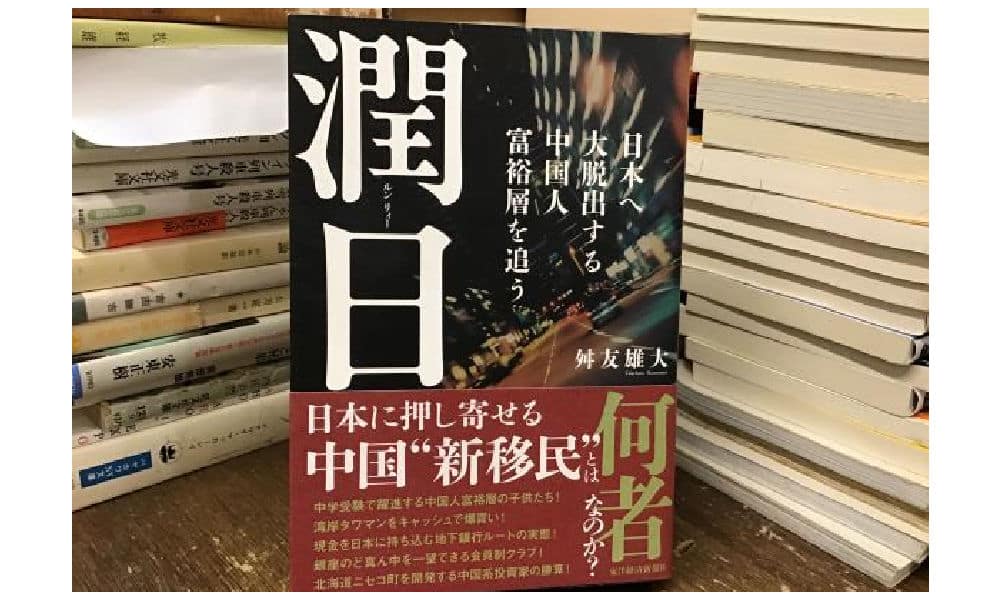
Over the past week, Japan has been trending every single day on Chinese social media in light of escalating bilateral tensions after Japanese PM Takaichi made remarks about Taiwan that China views as a direct military threat. The diplomatic freeze is triggering all kinds of trends, from rising anti-Japanese sentiment online and a ban on Japanese seafood imports to Chinese authorities warning citizens not to travel to Japan.
You’d think Chinese people would want to be anywhere but Japan right now — but the reality is far more nuanced.
In a recent feature in ChinaTalk, Jordan Schneider interviewed Japanese journalist & researcher Takehiro Masutomo (舛友雄大) who has just published a book about Japan’s new Chinese diaspora, explaining what draws Chinese dissidents, intellectuals, billionaires, and middle-class families to Tokyo.
The book is titled Run Ri: 潤日 Following the Footsteps of Elite Chinese Escaping to Japan (only available in Japanese and Traditional Chinese for now). (The word Rùn 润/潤, by the way, is Chinese online slang and meme expresses the desire to escape the country.)
A very interesting read on how Chinese communities are settling in Japan, a place they see as freer than Hong Kong and safer than the U.S., and one they’re surprisingly optimistic about — even more so than the Japanese themselves.
Thanks for reading this Eye on Digital China Signals. For fast-moving trends and deeper dives, keep an eye on the upcoming newsletters.
And if you just so happen to be reading this without a subscription and appreciate my work, consider joining to receive future issues straight in your inbox.
A small housekeeping note:
This Eye on Digital China newsletter is co-published for subscribers on both Substack and the main site. If you’re registered on both platforms, you’ll receive duplicate emails — so if that bothers you, please pick your preferred platform and unsubscribe from the other.
Many thanks to Miranda Barnes for helping curate some of the topics in this edition.
— Manya
Spotted an error or want to add something? Comment below or email me.
First-time commenters require manual approval.
©2025 Eye on Digital China / What’s on Weibo. Do not reproduce without permission —
contact info@whatsonweibo.com.
China Insight
“Jiangyou Bullying Incident”: From Online Outrage to Offline Protest
“You think we’re scared of you? It’s not like we haven’t been to jail before.”
Published
4 months agoon
August 6, 2025
These days have been filled with tension and anger in the city of Jiangyou (江油市), Sichuan, after a rare, large-scale protest broke out following public outrage over a severe bullying incident and how it was handled.
The bullying incident at the center of this story happened outside school premises in Mianyang on the afternoon of July 22. Footage of the assault, recorded by bystanders at the scene, began circulating widely online on August 2, sparking widespread outrage among concerned netizens, many of them worried parents.
The violent altercation involved three girls between the ages of 13 and 15 who ganged up on another minor, a 14-year-old girl named Lai (赖).
After Lai and a 15-year-old girl named Liu (刘) reportedly had a dispute, Liu gathered two of her friends—the 13-year-old also named Liu (刘) and a 14-year-old named Peng (彭)—to gang up on Lai.
The three underage girls lured Lai to an abandoned building, where they subjected her to hours of verbal and physical violence. The footage showed how they took turns in kicking, slapping, and pushing her.
At one point, after Lai said she would call the police, one of the bullies yelled: “You think we’re scared of you? It’s not like we haven’t been to jail before. I’ve been in more than ten times—it doesn’t even take 20 minutes to get out” (“你以为我们会怕你吗?又不是没进去过,我都进去十多次了,没二十分钟就出来了”).
That same night, the incident was reported to police. It took authorities until August 2 to bring in all involved parties for questioning, and a police report was issued on the morning of Monday, August 4.
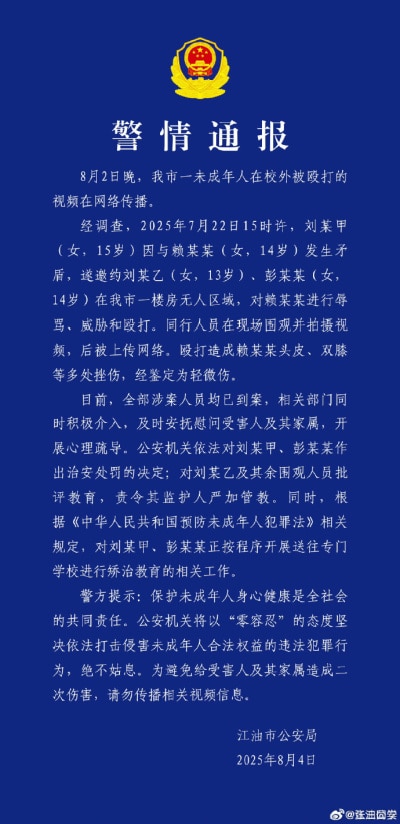
Police report by Jiangyou Public Security Bureau, confirming the details of the incident and the (legal) consequences for the attackers.
Two of the girls (the 15- and 14-year-old) were given administrative penalties and will be sent to a specialized correctional school. The younger Liu and other bystanders were formally reprimanded.
“Parents Speak Out for the Bullied Girl”
The way the incident was handled—not just the relatively late official report, but mostly the perceived lenient punishment—triggered anger online.
Many people who had seen the video responded emotionally and felt that the underage girls should be stripped of their rights to take their exams, and that the bullying incident should forever haunt them in the same way it will undoubtedly haunt their victim.
Especially the phrase “It’s not like I haven’t been taken in [to jail] before” struck a chord, as it showed just how calculated the bullies were—and how, by counting on the leniency of the Chinese judicial system for minors, they made the system complicit in their determination to turn those hours into a living hell for Lai.
China has been dealing with an epidemic of school violence for years. In 2016, Chinese netizens were already urging authorities to address the problem of extreme bullying in schools, partly because minors under the age of 16 rarely face criminal punishment for their actions.
Since 2021, children between the ages of 12 and 14 can be held criminally responsible for extreme and cruel cases resulting in death or disability—but their legal prosecution must first be approved by the Supreme People’s Procuratorate (SPP).
It has not done much to stop the violence.
Discussions around extreme bullying like this have repeatedly flared up over the years, such as in 2020, when a 15-year-old schoolboy named Yuan (袁) in Shaanxi was fatally beaten and buried by a group of minors.
Last year, a young boy named Wang Ziyao (王子耀) was killed by three classmates after suffering years of bullying. His body was found in a greenhouse just 100 meters from the home of one of the suspects, and the case shocked and enraged local residents.
But the problem is widespread among girls, too.
In 2016, we already reported on how so-called ‘campus violence videos’ (校园暴力视频) had become a concerning trend. In these kinds of videos—often showing multiple bullies beating up a single victim on camera—it’s not uncommon to see girls as the aggressors.
Girls often form cliques to gang up on a victim to show that they are in control or to gain popularity. They also tend to be more inclined than boys to make cruel jokes or stage pranks meant to embarrass or humiliate their target. This may partly explain why there seem to be more campus violence videos on Chinese social media showing girls bullying girls than boys bullying boys.
In the case of Lai, she appears to have been particularly vulnerable. One of her relatives posted online that her mother is deaf and mute, and her father allegedly is disabled. This fact may have contributed to why Lai was repeatedly targeted and bullied by the same group of girls, who reportedly took away her phone and socially isolated her at school.
In response to the incident, netizens started posting the hashtag “Parents Speak Up for the Bullied Girl” (“#家长们为被霸凌女孩发声#), not only to support Lai and her family, but to demand harsher punishments for school bullies and for stricter crackdown on this nationwide problem.
From Online Anger to Offline Protest
While many people spoke out for Lai online, hundreds also wanted to show up for her in person.
On August 4, dozens of people gathered in front of the Jiangyou Municipal Government building (江油市人民政府) to demand justice and support Lai’s parents, who had come to express their grievances to the authorities—at one point even bowing to the ground in a plea for justice to be served for their daughter.

Footage and images circulating on social media showing the parents of Lai, the victim, bowing on the ground to demand justice from authorities.
As the crowd grew larger, tensions escalated, eventually leading to clashes between protesters and police.
The arrests at the scene did little to ease the situation. As night fell, the mood grew increasingly grim, and some protesters began throwing objects at the police.
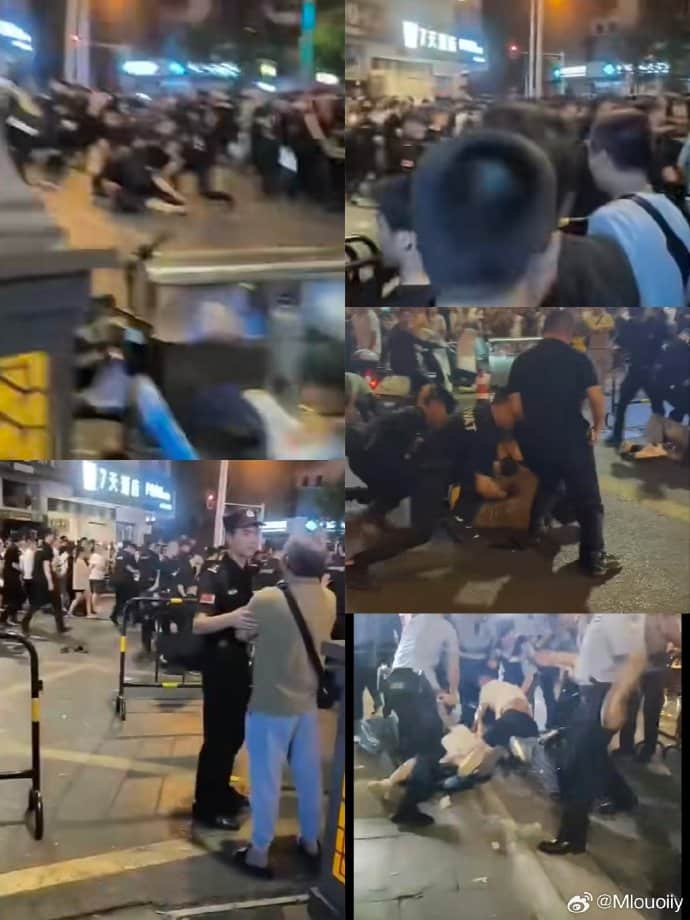
Images of the protest, posted on Weibo.
Near the east section of Shixian Road (诗仙路东段), more people gathered. Hundreds of individuals filming and livestreaming captured footage of the police crackdown—officers beating protesters, dragging them away, and deploying pepper spray.

Netizens’ digital artwork about the bullying incident, the parents’ grievances, and the public protest and its crackdown in Jiangyou. Shared by 程Clarence.
Although the protests briefly gained traction on social media and became a trending topic on Weibo, the search term was soon removed from the platform’s trending list.
Lasting Mental Scars
On Tuesday, August 5, several topics related to the Jiangyou bullying incident began trending again on Chinese social media.
On the short video app Kuaishou, a collective demand for justice surged to the number one spot, under the tag “A large number of Jiangyou parents demand justice for the victim” (江油大批家长为受害学生讨公道).
As of now, none of the perpetrators’ families have come forward to apologize.
As for Lai—according to the latest reports, she did not suffer serious physical injuries from the bullying incident, but according to her own parents, the mental scars will last. She will need continued mental health support and counseling going forward.
Although many posts about the incident and the ensuing protests have been taken offline, ‘Jiangyou’s Bullying Incident’ has already become one more case in the growing list of brutal school bullying incidents that have surfaced on Chinese social media in recent years. The heat of local anger may fade over time, but the rising number of such cases continues to fuel public frustration nationwide—especially if local authorities fail to do more to address and prevent school bullying.
“Not being able to protect our children, that’s a disgrace to our schools and the police,” one commenter wrote: “I want to thank all those mothers who have raised their voices for the bullied child. Each of us must say no to bullies, and we must do all we can to stop them. I hope the lawmakers agree.”
By Manya Koetse
(follow on X, LinkedIn, or Instagram)
Spotted a mistake or want to add something? Please let us know in comments below or email us. First-time commenters, please be patient – we will have to manually approve your comment before it appears.
©2025 Whatsonweibo. All rights reserved. Do not reproduce our content without permission – you can contact us at info@whatsonweibo.com.
Subscribe
Eye on Digital China is a reader-supported publication by
Manya Koetse (@manyapan) and powered by What’s on Weibo.
It offers independent analysis of China’s online culture, media, and social trends.
To receive the newsletter and support this work, consider
becoming a paid subscriber.

Get in touch
Have a tip, story lead, or book recommendation? Interested in contributing? For ideas, suggestions, or just a quick hello, reach out here.

Signals: Hasan Piker’s China Trip & the Unexpected Journey of a Chinese School Uniform to Angola

About Eye on Digital China — Powered by What’s on Weibo

China Trend Watch: Japan Tensions, Nexperia Fallout, Yunnan’s ‘Wild Child,’ & “Modern Opium”

Eye on Digital China: How Chinese Social Media Evolved from the Blog Era to the AI-driven Age

Trump and Takaichi: The Unexpected Love Affair

The Wong Kar-wai Scandal Explained: The Dark Side of ‘Blossoms Shanghai’

From Schadenfreude to Sympathy: Chinese Online Reactions to Charlie Kirk Shooting

From Nobel Farewell to ‘VIP Toilets’: What’s Trending in China

From Tents to ‘Tangping Travel”: New Travel Trends among Young Chinese

China’s “Post Parade Afterglow”: 6 Social Media Trends
Popular Reads
-

 China Memes & Viral4 months ago
China Memes & Viral4 months agoHidden Cameras and Taboo Topics: The Many Layers of the “Nanjing Sister Hong” Scandal
-

 China Insight7 months ago
China Insight7 months agoUnderstanding the Dr. Xiao Medical Scandal
-

 China Memes & Viral11 months ago
China Memes & Viral11 months agoOur Picks: Top 10 Chinese Buzzwords and Phrases of 2024 Explained
-

 China Digital10 months ago
China Digital10 months ago“Dear Li Hua”: The TikTok/Xiaohongshu Honeymoon Explained





